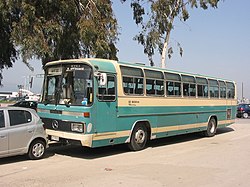Biamax
Biamax (pronounced: Viamax) was a Greek commercial vehicle manufacturer with plants in Athens, Thessaloniki and Larissa, at times employing 2,000 people. In addition to in-house developments, Mercedes-Benz buses were also manufactured under license.
history

In the 1930s, Fostiropoulos opened a sales office for vehicles from Daimler-Benz AG. The company was extremely successful and in 1956 founded the body shop Biamax. In 1961 the "R" series was presented as the first in-house development, developed by the engineer A. Rizos and designed by the designer I. Dracoulis. In 1962 the company took part in a tender for trolleybuses in Athens, but was subject to an Italian consortium, only the prototype was accepted and remained in operation for 30 years. In 1968 the "F" series was presented, including the F580S city bus.
In the 1980s, the company began to decline, for two main reasons: the socialist government gave preference to Hungarian Ikarus buses in tenders, which were offered at dumped prices due to the communist country's hunger for foreign currency, while the tariffs on buses were lifted which led to a surge in the import supply of young used buses and ruined the market.
The company's exports (mainly to the Middle East) were insufficient for the company's existence. In 1984 production was stopped and the systems were sold to Turkey.
Biamax tried its hand at importing tractors and trucks as well as importing Rover automobiles, and in 1993 also importing the DAF Den Oudsten-Biamax bus brand. In 1999 the company stopped all business activities, but still exists as a real estate asset manager. It rejected a purchase offer from Lidl , which was intended to convert the facilities into distribution centers.

